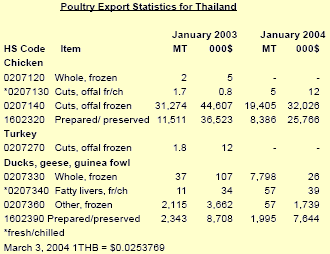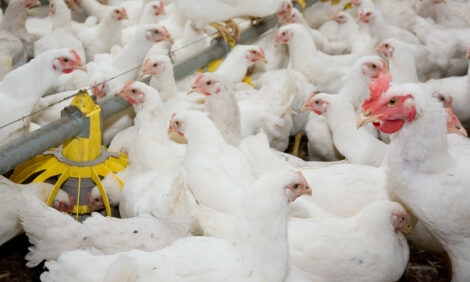



International Egg and Poultry Review
By the USDA's Agricultural Marketing Service - This is a weekly report looking at international developments concerning the poultry industry, this week following the latest news on the Avian Influenza outbreak in Japan.
Avian Influenza In Japan
Japan reeled from several new outbreaks of avian influenza. In late
February a large number of chickens began dying at a farm owned by
Asada Nosan Co, a poultry-processing firm. Even with the death of
about 67,000 chickens, the outbreak was not reported to the local
veterinary authorities for a week. The farm, located in the western
prefecture of Kyoto, sold about 15,000 live chickens and shipped
around 900,000 eggs even though more than 1,000 chickens were
dying daily. By the time authorities were notified by an anonymous
caller, it was too late to contain the disease in its early stages. Poultry
and eggs from the flock had reached possibly 15 prefectures, sparking
confusion among processing companies, wholesalers and
consumers.
Fears grew that the outbreak was spreading after two dead crows
found near Asada’s farm tested positive for the H5 strain of the avian
influenza. Another case of avian influenza was confirmed in a small
broiler flock at a farm five kilometers from the Asada Nosan farm and
a possible outbreak was suspected on a farm in Shimane prefecture
after 74 young chickens out of a flock 420 died during February 29 -
March 3.
In reaction to the spreading outbreak, poultry farms within a 30-
kilometer radius were banned from moving any poultry products. An
army taskforce went to help disinfect chicken farms, people and
vehicles entering and leaving the cordoned-off area. The area
encompasses parts of Kyoto, Hyogo and Osaka prefectures and
contains 82 poultry farms. According to officials, during the period of
February 27 to March 6, the stockpile of eggs totaled about 9 million
and was growing at the rate of 1 million per day.
Japan’s first case of avian influenza H5N1 occurred in early January
in one layer flock in the southwestern prefecture of Yamaguchi. The
second case occurred in February, when a hobby flock in Oita
Prefecture tested positive for H5N1. The second flock was on an
island across a narrow body of water from the first outbreak. Authorities
were successful in controlling both outbreaks.
Source: FAO Update on Avian Influenza situation, multiple news wires
FSIS Library of Export Requirements – Japan
Poultry and poultry products in hermetically sealed containers
processed to 100 degrees C are eligible for export to Japan.
Japan will accept poultry and poultry products slaughtered on or before
January 25, 2004, and shipped before February 7, 2004 (Bill of Lading
date), if the product meets certain conditions.
Japan will accept egg products produced on or before January 25,
2004 and shipped before February 7, 2004 (Bill of Lading date), with
certain restrictions.
Mexico Partially Lifts Ban
Mexico said it would partially lift its ban on imports of U.S. poultry. The
ban was imposed two weeks earlier after highly pathogenic avian
influenza was discovered in a small flock in Texas. Mexico will allow
imports of mechanically deboned chicken and turkey parts and deboned
turkey thigh meat. A ban continues on all poultry products from states
where avian influenza has been detected.
Source: multiple news wires
Thailand Resumes Some Exports to Japan
On Monday, March 8, Japan announced it will resume imports of
processed chicken items from 22 factories in Thailand. The plants had
passed inspections by Japanese health officials. Products made in
Thailand represent about 30 percent of Japan’s imported processed
chicken. Stocks of Charon Pokphand Foods and GFPT were higher on
March 8 following Japan’s resumption of cooked chicken imports from
Thailand.
Thailand declared the country free of avian influenza on Monday, March 8
and announced that farmers will resume breeding chickens in April.
Thailand said no areas of the country have had an active case of avian
influenza since February 25. OIE, the World Organization of Animal Health,
allows the breeding of new chicken stocks three weeks after no new
cases have been found.
Source: OIE, news wires

Source: Statistics Committee of the CIS
To view the full report, including tables please click here (PDF Format)
Source: USDA's Agricultural Marketing Service - 9th March 2004









